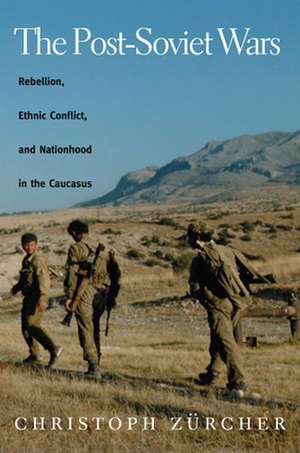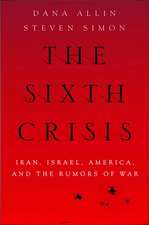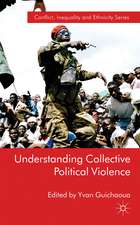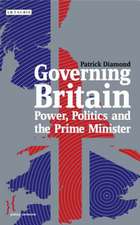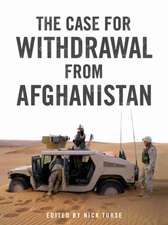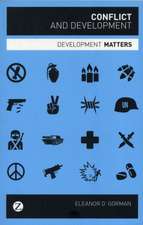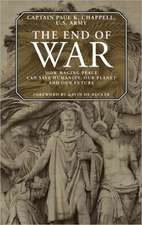The Post–Soviet Wars – Rebellion, Ethnic Conflict, and Nationhood in the Caucasus
Autor Christoph Zurcheren Limba Engleză Hardback – 31 oct 2007
| Toate formatele și edițiile | Preț | Express |
|---|---|---|
| Paperback (1) | 242.60 lei 6-8 săpt. | |
| MI – New York University – 31 aug 2009 | 242.60 lei 6-8 săpt. | |
| Hardback (1) | 527.18 lei 6-8 săpt. | |
| Wiley – 31 oct 2007 | 527.18 lei 6-8 săpt. |
Preț: 527.18 lei
Preț vechi: 684.65 lei
-23% Nou
Puncte Express: 791
Preț estimativ în valută:
100.88€ • 107.87$ • 84.11£
100.88€ • 107.87$ • 84.11£
Carte tipărită la comandă
Livrare economică 18 aprilie-02 mai
Preluare comenzi: 021 569.72.76
Specificații
ISBN-13: 9780814797099
ISBN-10: 0814797091
Pagini: 308
Dimensiuni: 160 x 233 x 24 mm
Greutate: 0.54 kg
Editura: Wiley
ISBN-10: 0814797091
Pagini: 308
Dimensiuni: 160 x 233 x 24 mm
Greutate: 0.54 kg
Editura: Wiley
Recenzii
"This is an uncommonly well-argued and well-written explanation of the violent conflicts that erupted across the Caucasus during and after the collapse of the Soviet Union. With exceptional clarity of thought, Zürcher melds established statistical studies of internal wars with a carefully constructed comparison of the origins and courses of the Chechen, Georgian, and Nagorno-Karabakh wars. Foreign Affairs"With his exciting narratives and compelling analysis of the twentieth century's Caucasian Wars, Zürcher brings events on the periphery of Europe into the mainstream of social science and comparative politics. Disputing existing explanations of internal wars, he shows that rather than mountainous terrain or poverty, a more powerful causal explanation of civil bloodletting can be located in state capacities and the abilities of combatants to finance their struggles. This book is sure to stir debate. Ronald Grigor Suny, University of Michigan"Democracy is commonly paired with order while ethnic violence is paired with strife and chaos. The Post-Soviet Wars painstakingly documents that both violence and stability have institutional reasons and must be organized politically by specific human agencies. This lesson is obviously relevant to the contemporary discussion of democratization as well as failing states, let alone the effects wrought by the American war on terror. Georgi Derlugyan, author of Bourdieu's Secret Admirer in the Caucasus: A World-System Biography
"This is an uncommonly well-argued and well-written explanation of the violent conflicts that erupted across the Caucasus during and after the collapse of the Soviet Union. With exceptional clarity of thought, Zurcher melds established statistical studies of internal wars with a carefully constructed comparison of the origins and courses of the Chechen, Georgian, and Nagorno-Karabakh wars." Foreign Affairs "With his exciting narratives and compelling analysis of the twentieth century's Caucasian Wars, Zurcher brings events on the periphery of Europe into the mainstream of social science and comparative politics. Disputing existing explanations of internal wars, he shows that rather than mountainous terrain or poverty, a more powerful causal explanation of civil bloodletting can be located in state capacities and the abilities of combatants to finance their struggles. This book is sure to stir debate." Ronald Grigor Suny, University of Michigan "Democracy is commonly paired with order while ethnic violence is paired with strife and chaos. The Post-Soviet Wars painstakingly documents that both violence and stability have institutional reasons and must be organized politically by specific human agencies. This lesson is obviously relevant to the contemporary discussion of democratization as well as failing states, let alone the effects wrought by the American war on terror." Georgi Derlugyan, author of Bourdieu's Secret Admirer in the Caucasus: A World-System Biography
"This is an uncommonly well-argued and well-written explanation of the violent conflicts that erupted across the Caucasus during and after the collapse of the Soviet Union. With exceptional clarity of thought, Zurcher melds established statistical studies of internal wars with a carefully constructed comparison of the origins and courses of the Chechen, Georgian, and Nagorno-Karabakh wars." Foreign Affairs "With his exciting narratives and compelling analysis of the twentieth century's Caucasian Wars, Zurcher brings events on the periphery of Europe into the mainstream of social science and comparative politics. Disputing existing explanations of internal wars, he shows that rather than mountainous terrain or poverty, a more powerful causal explanation of civil bloodletting can be located in state capacities and the abilities of combatants to finance their struggles. This book is sure to stir debate." Ronald Grigor Suny, University of Michigan "Democracy is commonly paired with order while ethnic violence is paired with strife and chaos. The Post-Soviet Wars painstakingly documents that both violence and stability have institutional reasons and must be organized politically by specific human agencies. This lesson is obviously relevant to the contemporary discussion of democratization as well as failing states, let alone the effects wrought by the American war on terror." Georgi Derlugyan, author of Bourdieu's Secret Admirer in the Caucasus: A World-System Biography
Descriere
Provides both an overview of the Caucasus that is both up-to-date and comprehensive as well as an accessible understanding of the current scholarship on mobilization and violence
Cuprins
Preface; 1. Introduction 1; 2. Setting the Stage: The Past, the Nation, and the State 14; 3. Making Sense: Conflict Theory and the Caucasus 51; 4. Wars over Chechnya 90; 5. Wars in Georgia 151; 6. The War over Karabakh 202; 7. Wars that did not happen: Dagestan and Ajaria 249; 8. Conclusion: Post-Soviet Wars and Theories of Internal Wars 280; Bibliography 311; Notes 337; About the Author; Index
